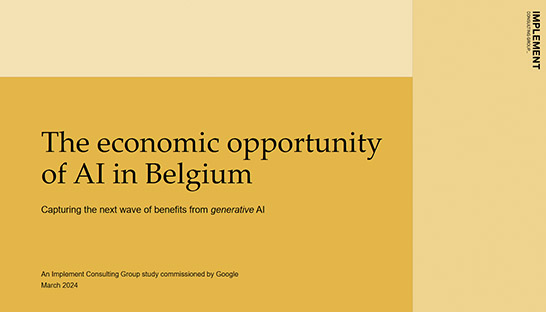Generative AI boosts Belgian economy by €50 billion in decade

Generative AI (Gen AI) could boost Belgium’s economy up to €50 billion over the next 10 years. That is according to a report from Implement Consulting Group commissioned by internet giant Google.
If industries in Belgium move towards wide scale adoption of Gen AI technology – in a variety of forms and across many different sectors – the country’s GDP could see an overall increase of 9% over the coming decade, according to the report.
Most of that additional value would come from a large increase in productivity. One of the main appeals of Gen AI tools is that it can free up workers from menial and repetitive tasks. That would allow a large number of workers to be re-employed to focus on more value-creating tasks, which on its own could represent a €10 to €12 billion boost.
Source: Implement Consulting Group
In recent years, Gen AI has been popularized by incredibly popular and widely-used tools that have become available to the public, like ChatGPT and DALL-E. But further from just creating images, the technology is used in many valuable business use cases like in powering chatbots, organizing and summarizing huge reams of documents, and more.
The Gen AI-fueled boost in productivity in Belgium’s could equate to around 1.6% of the country’s GDP annually. In fact, the potential future economic growth in Belgium’s linked to Gen AI has led banks to raise their growth forecasts for the country.
The main sectors where the Gen AI will make a big difference are IT, business services, and real estate, according to the study. When it comes to the public sector, the technology is also expected to have substantial impacts in areas such as public administration, education, and healthcare.
Source: Implement Consulting Group
The jobs market
As for the huge number of jobs that will be affected by the adoption of Gen AI in Belgium, 64% (or 3.2 million jobs) will be augmented by the technology and employees will likely begin to use it in their daily roles, likely in part to work on complex problems or to create texts, codes, or images.
But not all jobs will be affected. A total of around 29% of jobs are not projected to be exposed to Gen AI at all. Most of that is work like manual labor and human-focused roles. The report notes that only around 7% of jobs will actually be replaced by Gen AI, with many likely to require re-employment.
Source: Implement Consulting Group
“Generative AI will boost global economic growth in the coming decade,” said Martin Thelle, partner at Implement Consulting Group. “It can increase productivity and boost Belgium’s competitiveness. To capture the next wave of AI benefits across society, Belgium needs to promote innovation, invest in skills and ensure clear rules.”
A previous report from Implement Consulting Group found that Gen AI technology could boost the Dutch economy by around €85 billion over the next decade, with the relative impact comparable to that in neighboring Belgium.
AI technology is quickly becoming a crucial innovation for a large number of industries. While there is currently a race to adopt AI there has also been some hesitance due to the anticipated impact of looming new regulations, like the EU’s AI Act or the AI Bill of Rights in the US.



